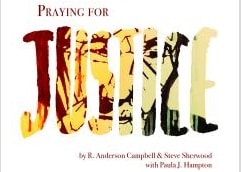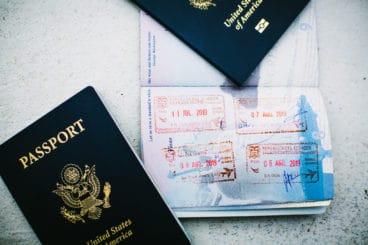
It started the way these things often do—a routine announcement from the pilot that they had a warning light in the cockpit. We couldn’t take off yet. So we sat on the tarmac in Quito, surrounded by the Andes mountains, and we waited. Next came the announcement that they needed to bring a maintenance crew onboard, requiring us to go back to the gate. So we went back to the gate, and we waited.
Then, “Uhh, folks, this is the captain speaking. I’m really sorry about this, but we’re going to need to disembark.” So our family (my wife, three small children ages five, eight, and nine, and I) got off the plane, and we waited some more.
That’s when our waiting game took a surreal turn. For reasons no one fully explained, we not only had to leave the plane…we had to exit the terminal.
Since we had already cleared customs and legally “left” Ecuador, leaving the terminal meant reentering the country, passport stamps, and all.
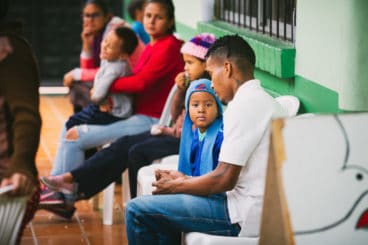
As we stumbled toward the migration control officer at 3 am, my kids nodding off with their heads propped against rolling suitcases, I was too tired to fully recognize the irony.
It was migration that had brought us to Ecuador in the first place. As its neighbors to the east and the north (Colombia and Venezuela, primarily) experience spiraling violence and economic collapse, Ecuador has become a hub of migration. Exact numbers are hard to come by, but most estimates suggest that about half a million Venezuelans will flee to Ecuador in 2019.

In Quito, a small Mennonite church is busy being the hands and feet of Jesus to refugees who arrive in their community. By offering food, clothing, mattresses, cookstoves, and fuel, they hope to alleviate some of the most desperate sufferings. As a Mennonite pastor who serves a congregation that also works with refugees, it made sense to spend a portion of my sabbatical learning from and serving with the Proyecto para Personas Refugiadas y Migrantes.
Together, our family packaged food. We passed out coffee. We staffed the clothing closet. We played with kids. We held babies. We listened to stories. We caught a small glimpse into the fear and desperation that can drive a family to flee the only home they’ve ever known, hoping that an unfamiliar country might be safer than what used to be the comforts of home.
We caught a small glimpse into the fear and desperation that can drive a family to flee the only home they’ve ever known, hoping that an unfamiliar country might be safer than what used to be the comforts of home.
As Warsan Shire writes,
no one leaves home unless
home is the mouth of a shark
you only run for the border
when you see the whole city running as well
She goes on to write, “you only leave home // when home won’t let you stay.”
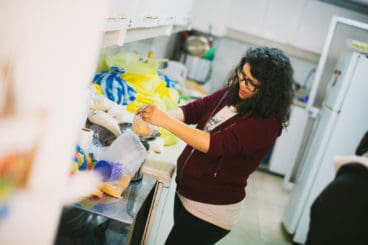
We met dozens of people whose homes had become the mouth of a shark. Then came those disorienting few days when home might let us stay, but the airline wouldn’t let us leave. While we scrambled to make new travel plans, we thought about how our light and momentary afflictions paled in comparison to the harrowing journeys our new friends had made.
It’s a hassle to collect your luggage at baggage claim before ever leaving the ground, but we weren’t fleeing home with anything but the clothes on our backs.
It’s uncomfortable when you can’t sleep in your own bed, but the airline wasn’t about to let us sleep on the streets.
It’s annoying to unpack and repack your suitcases, but we weren’t relying on the kindness of strangers to pass along discarded clothing in hopes of keeping our kids warm.
It’s frustrating to have your eating schedule disrupted by long delays, but we weren’t depending on a few kilograms of rice, quinoa, and lentils to feed our family for a month.
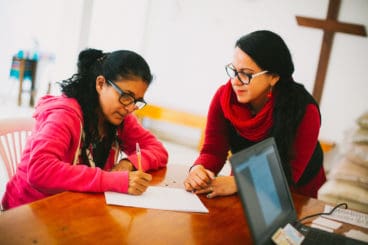
The refugees we met in Ecuador are one part of a global crisis: from Syria to Iraq, Somalia to Burma, El Salvador to Venezuela, people who want to go home.
But.
home is the mouth of a shark
home is the barrel of the gun
and no one would leave home
unless home chased you to the shore
Will I work to be the hands and feet of Jesus in my home community, helping home be a place of safety, refugee, and welcome?
Now, as someone who lives on the other side of those shores, I have to answer a question: Will I work to be the hands and feet of Jesus in my home community, helping home be a place of safety, refugee, and welcome? Or will I sit idly by as the sharp teeth of fear and ignorance, greed and selfishness cut through the gum lines, disfiguring my home slowly, subtly, but surely into the mouth of another shark?
 Jon Carlson serves as Lead Pastor of Forest Hills Mennonite Church outside of Lancaster, PA. Jon and his wife, Lyn, are raising three kids who seem to have endless supplies of energy. Follow him on Facebook, Twitter, or Instagram.
Jon Carlson serves as Lead Pastor of Forest Hills Mennonite Church outside of Lancaster, PA. Jon and his wife, Lyn, are raising three kids who seem to have endless supplies of energy. Follow him on Facebook, Twitter, or Instagram.

